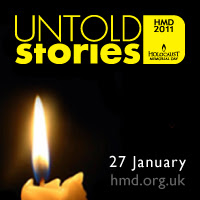Telling Untold Stories
Today is Holocaust Memorial Day.
In the Archbishop of Canterbury's Statement for Holocaust Memorial Day 2011 he speaks of the need to remember Holocaust stories and the many stories of people who suffered similar tragedies since. Archbishop Rowan says:
Huge statistics of mass murder and degradation of people are hard to comprehend. Individual stories, told through art, poetry, story and memorial objects, highlight the significance of those statistics. In a blog post last year I wrote about how moved I was by hand-stitched baby garments seen in the Auschwitz-Birkenau museum. I can't cry for 6 million, but I can imagine that child (or was it that unborn baby?) who never grew up to tell his story.
Martin Niemöller, a German, was a Christian pastor and theologian who was confined in concentration camps during WW2 because he was
In the Archbishop of Canterbury's Statement for Holocaust Memorial Day 2011 he speaks of the need to remember Holocaust stories and the many stories of people who suffered similar tragedies since. Archbishop Rowan says:
"If the stories are not told over and again, we lose the memory of those who suffered and we risk losing something that protects our humanity."The theme promoted this year by the Holocaust Memorial Trust is 'untold stories'. The focus is to remember victims and survivors of the Nazi holocaust and subsequent genocides such as in Cambodia, Rwanda, Bosnia and Darfur. The idea is to encourage people to learn from history and consider what action they can take that could have a positive affect on their community.
Huge statistics of mass murder and degradation of people are hard to comprehend. Individual stories, told through art, poetry, story and memorial objects, highlight the significance of those statistics. In a blog post last year I wrote about how moved I was by hand-stitched baby garments seen in the Auschwitz-Birkenau museum. I can't cry for 6 million, but I can imagine that child (or was it that unborn baby?) who never grew up to tell his story.
Martin Niemöller, a German, was a Christian pastor and theologian who was confined in concentration camps during WW2 because he was
"not being enthusiastic enough about the Nazi movement".A statement attributed to him goes something like this:
"First they came for the communists,
and I didn't speak out because I wasn't a communist.
Then they came for the trade unionists,
and I didn't speak out because I wasn't a trade unionist.
Then they came for the Jews,
and I didn't speak out because I wasn't a Jew.
Then they came for me
and there was no-one left to speak out for me."So - I ask myself. Who needs someone to speak out for them today?

Comments
Post a Comment